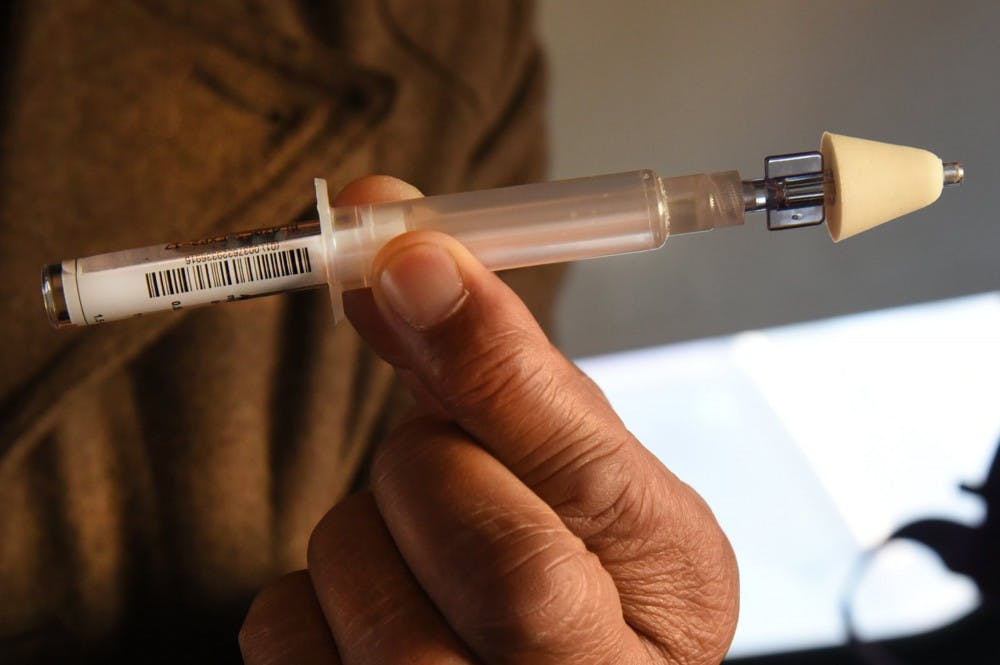While Delaware County is infamous for being the methamphetamine capital of Indiana, Muncie is now seeing heavy use of opioids and heroin.
In the month of November alone, the Delaware County Sheriff's Office saw 13 heroin overdose cases, according to Cpl. Jeff Stanley of the narcotics unit.
So far in 2018, Delaware County Emergency Communications has received at least 35 overdose calls. This includes all types of overdoses.
Heroin is found throughout the entire city of Muncie and among many different users, Stanley said.
“That’s the thing about heroin, there’s no particular area or community that it’s used [in] and there’s no particular demographic,” Stanley said. “It could be in the most troubled neighborhood at all, or in any particular socioeconomic group or demographic.”
Because there is no one area where the use is most prevalent, it can be difficult for police to stop the epidemic throughout the whole county, Stanley said.
“Muncie’s drug units are doing a fantastic job at trying to stop [heroin] from coming into our community. But like any other drug, because it’s so prevalent and because the demand is so high, you stop one person and three more are stepping up,” Stanley said. “Until the next flavor comes in, heroin is definitely the one that is difficult to get a grasp on right now.”
Over the past six years, Stanley, who has worked in narcotics since the late 1990s, has noticed “it’s spiked.”
Stanley said that often times, officers in Indiana won’t arrest a highly intoxicated heroin user because of liability reasons.
“A lot of times, if someone is highly intoxicated, or has too much in their system, they’re going to have to go to the hospital. I know what sheriffs try to avoid is taking the burden of bills from the patient,” Stanley said. “If they’re admitted into the jail, they’re automatically our responsibility, so if something was to happen to them and they have to go to the hospital for treatment, that’s our responsibility and we have to pay for it.”
If a department were to incur the hospital bills, the payment is made from taxpayers’ money, and departments are “trying not to burden taxpayers,” Stanley said.
To avoid this, police wait for a patient to be cleared from the hospital and then get a warrant to arrest them.
While in the hospital, a heroin overdose can be reaffirmed through certain signs such as respiratory depression, pinpoint pupils with no reaction to light and eyes rolling in the back of the patient’s head, said Tim Gant, a trauma nurse at IU Health Ball Memorial Hospital.
It’s hard to pinpoint how many heroin overdoses the hospitals sees in a week, Gant said.
Heroin affects the brain in a negative way when overdosed, Gant said. This can include lack of oxygen to the brain, which could lead to the patient becoming completely brain dead.
The process of recovering from a heroin overdose includes a Narcan injection as soon as possible. Injections can happen inner nasally or through the veins from an IV, Gant said.
“Narcan is a drug that competes for opiate receptors in your brain and basically takes over when the opiate are binding with neurons,” Gant said. “It’s almost an instantaneous reversal of the opioid effects.”
Narcan has no bad effects on the brain, but common side effects of using Narcan include instant withdrawal, which can lead to the feeling of being cold and tremors known as the “Narcan shakes,” Gant said.
While stopping the overdose is important, Gant said the main concern is making sure the patient has an open airway. Some cases involve bagging, which is a process where nurses pump oxygen into a patient’s lungs.
Contact Devan Sticka with comments at desticka@bsu.edu or on Twitter at @de_sticka.





